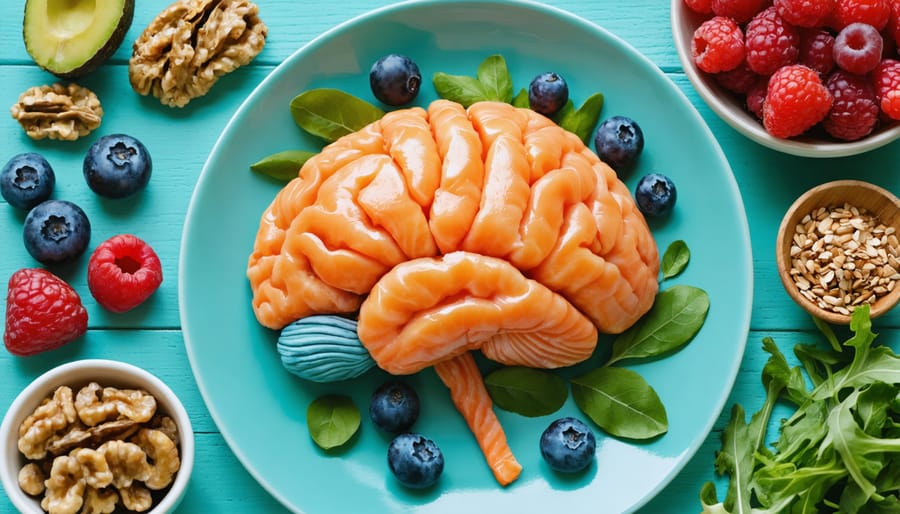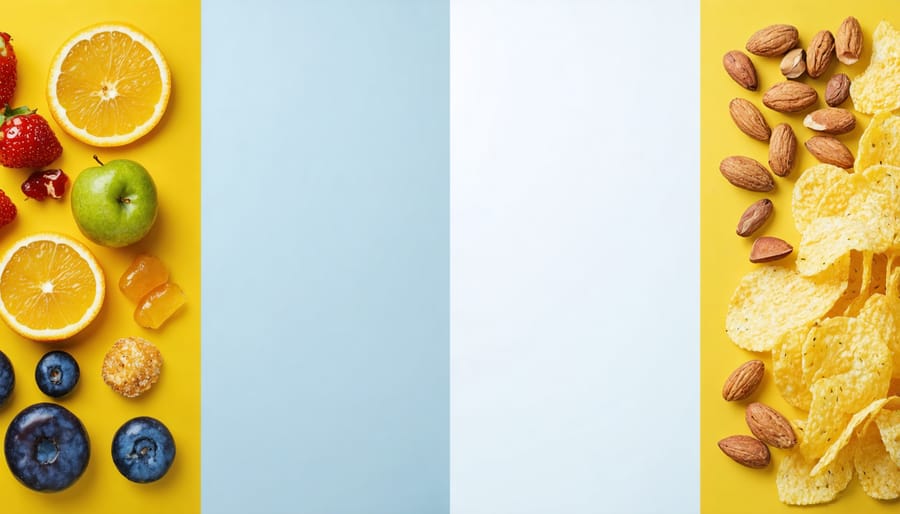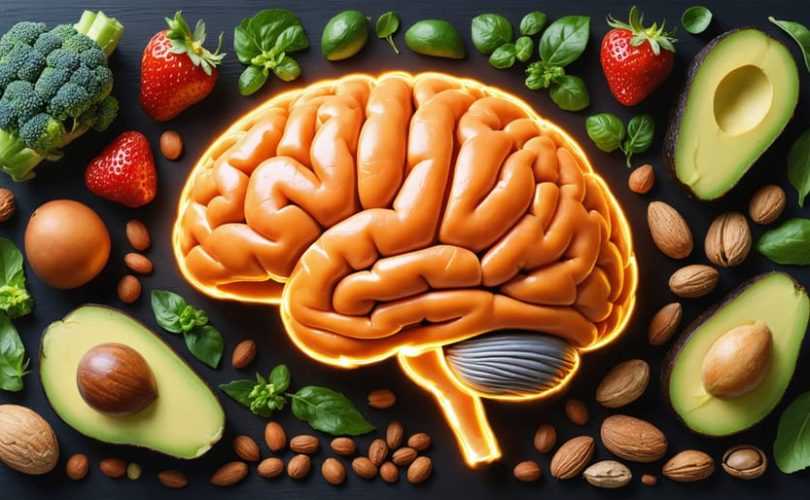The foods we serve our children do more than fuel their bodies – they shape their mental well-being in profound ways. Research increasingly reveals a powerful connection between diet and mental health, particularly during crucial developmental years. Just as a car needs the right fuel to run smoothly, our children’s brains require specific nutrients to regulate mood, maintain focus, and build emotional resilience.
As parents, we often focus on physical growth, but nutrition’s impact on mental health deserves equal attention. Studies show that children who consume a balanced diet rich in whole foods experience better emotional regulation, improved cognitive function, and reduced anxiety symptoms. Conversely, diets high in processed foods and refined sugars have been linked to increased rates of depression and attention difficulties in young people.
The good news? Small dietary changes can make a significant difference in your child’s mental wellness. Whether you’re dealing with mood swings, attention challenges, or simply want to support your child’s emotional development, understanding the food-mood connection is your first step toward nurturing both body and mind.

Brain-Boosting Foods That Support Child Mental Health
Omega-3 Rich Foods for Emotional Balance
Omega-3 fatty acids are like brain-boosting superheroes that help maintain emotional balance and support healthy brain development in children. One of the best sources is fatty fish, such as salmon, mackerel, and sardines, which provide essential DHA and EPA that our brains need to function optimally.
Dr. Sarah Chen, a pediatric nutritionist, explains, “I’ve seen remarkable improvements in children’s mood and focus when parents incorporate omega-3 rich foods into their daily meals. Even small changes can make a big difference.”
For families following plant-based diets or those with children who don’t enjoy fish, there are plenty of alternatives. Walnuts, chia seeds, and flaxseeds are excellent sources of omega-3s. Try sprinkling ground flaxseeds on morning oatmeal or adding chia seeds to smoothies. Hemp seeds can be mixed into yogurt or sprinkled on salads for a nutty crunch.
For picky eaters, creative approaches work well. Consider making homemade trail mix with walnuts and seeds, or baking omega-3 rich ingredients into muffins or breakfast bars. Remember, consistency is key – aim to include these foods in at least one meal daily for the best results.
Mood-Stabilizing Proteins and Complex Carbohydrates
When it comes to supporting your child’s mental well-being through diet, proteins and complex carbohydrates play crucial roles as nature’s mood stabilizers. Proteins contain essential amino acids that help produce important neurotransmitters like serotonin and dopamine, which regulate mood and behavior. Foods rich in lean proteins, such as fish, eggs, turkey, and legumes, provide a steady supply of these building blocks for emotional stability.
Complex carbohydrates are equally important, acting as the brain’s primary energy source. Unlike simple sugars that cause rapid mood swings, complex carbs release energy slowly, helping maintain stable blood sugar levels and consistent mood throughout the day. Whole grains, sweet potatoes, and quinoa are excellent choices that provide this sustained energy release.
Dr. Sarah Chen, a pediatric nutritionist, explains: “Think of complex carbs and proteins as your child’s emotional fuel tank. When these nutrients are properly balanced, children are better equipped to handle daily challenges and maintain emotional equilibrium.”
Try combining these nutrients at meals – for example, serving whole grain toast with scrambled eggs for breakfast, or brown rice with fish for dinner – to maximize their mood-stabilizing benefits.
Vitamins and Minerals for Mental Clarity
Several key vitamins and minerals play a crucial role in supporting your child’s mental clarity and focus. Vitamin B12 and folate help maintain healthy brain function, while zinc supports memory and learning. Iron is essential for delivering oxygen to the brain, and low levels can affect mood and concentration. Magnesium helps reduce anxiety and supports better sleep, while vitamin D has been linked to improved mood and cognitive performance. Try incorporating foods like eggs, leafy greens, nuts, and fatty fish into your child’s diet to ensure they’re getting these vital nutrients. If you’re concerned about deficiencies, consult with your pediatrician about appropriate supplementation options.
Foods That May Impact Mental Health Negatively
Sugar and Processed Foods
We all know that sugary treats can make children temporarily excited, but the long-term impact of food choices on mood goes much deeper. When children consume excessive amounts of processed foods and added sugars, they often experience dramatic mood swings, difficulty concentrating, and increased irritability.
Sarah Thompson, a mother of two, noticed a significant improvement in her 8-year-old’s behavior after reducing sugary snacks. “Within weeks of switching to whole foods, my son became more balanced emotionally and could focus better at school,” she shares.
Research suggests that high sugar intake can trigger inflammation in the body and brain, potentially contributing to anxiety and depression. Processed foods often lack the essential nutrients that support healthy brain function and emotional regulation.
Instead of completely eliminating treats, try gradual changes. Replace sugary breakfast cereals with oatmeal topped with fresh fruit, or swap processed snacks with nuts and cheese. Remember, the goal isn’t perfection but progress. When children learn to enjoy wholesome foods early on, they’re better equipped to maintain stable moods and develop healthy eating habits for life.

Common Food Sensitivities
Understanding food sensitivities is crucial when exploring the connection between diet and mental health. While every child is unique, certain foods commonly trigger adverse reactions that can affect both mood and behavior. Gluten sensitivity, for instance, has been linked to anxiety and depression in some children, even without celiac disease.
Dairy products are another common sensitivity that may impact mental well-being. Some children experience mood changes, irritability, or difficulty concentrating after consuming dairy. This reaction might be due to either lactose intolerance or a casein sensitivity.
Artificial food colors and preservatives have also been associated with behavioral changes in sensitive children. Studies have shown that some children experience increased hyperactivity or attention difficulties after consuming these additives.
Sugar sensitivity, while not a traditional allergy, can significantly impact mood and behavior. Many parents report that their children experience emotional ups and downs, difficulty focusing, or increased anxiety after consuming sugary foods.
Consider keeping a food diary to track your child’s reactions to different foods. Note any changes in mood, behavior, or energy levels after meals. This information can be invaluable when working with healthcare providers to identify potential food sensitivities affecting your child’s mental health.
Always consult with a healthcare professional before making significant dietary changes, as they can help create a safe and effective plan for your child.
Creating a Mental Health-Supporting Meal Plan
Balanced Breakfast Ideas
Starting your child’s day with a nutritious breakfast can significantly impact their mood and mental performance. As Dr. Sarah Chen, pediatric nutritionist, often says, “Breakfast sets the tone for your child’s entire day, both mentally and physically.”
Consider these brain-boosting breakfast combinations:
– Whole grain toast with avocado and eggs, providing essential omega-3 fatty acids and protein
– Greek yogurt parfait with berries and nuts, rich in probiotics and antioxidants
– Oatmeal topped with banana and chia seeds, offering steady energy and important minerals
– Smoothie bowl with spinach, fruits, and pumpkin seeds, packed with vitamins and zinc
Remember to include a source of protein, complex carbohydrates, and healthy fats in each breakfast. This combination helps stabilize blood sugar levels, which is crucial for maintaining steady mood and focus throughout the morning.
For busy mornings, try preparing ingredients the night before. A parent shared, “Making overnight oats has been a game-changer for us. My daughter gets a nutritious breakfast, and our mornings are less stressful.”
Avoid sugary cereals and processed pastries, which can lead to energy crashes and mood swings later in the day.
Lunch and Dinner Solutions
Planning and preparing nutritious meals doesn’t have to be complicated. Start by building lunch and dinner plates that include lean proteins, whole grains, and plenty of colorful vegetables. A simple formula to follow is filling half your plate with vegetables, a quarter with lean protein, and a quarter with whole grains.
Quick and nutritious lunch ideas include turkey and avocado wraps, quinoa bowls with chickpeas and roasted vegetables, or Greek yogurt parfaits with fresh fruit and nuts. For dinner, try baked salmon with sweet potato and steamed broccoli, or make a hearty vegetable stir-fry with brown rice and tofu.
Make meal prep easier by cooking larger portions and storing leftovers for busy days. Get children involved in meal planning and preparation – this not only teaches them about healthy eating but also makes them more likely to try new foods. Keep healthy snacks readily available, like cut vegetables with hummus or apple slices with almond butter.
Remember that consistency matters more than perfection. If you’re having a busy day, even small improvements to your usual meals can make a difference in supporting mental well-being.
Healthy Snacks for Stable Moods
Choosing the right snacks can make a significant difference in maintaining stable moods throughout the day. As a mother of two, I’ve found that combining protein with complex carbohydrates creates the perfect balance for sustained energy and emotional stability.
Some excellent mood-supporting snack options include:
– Apple slices with almond butter
– Greek yogurt topped with berries and honey
– Trail mix with nuts, seeds, and dark chocolate
– Hummus with colorful vegetable sticks
– Whole grain crackers with cheese
– Hard-boiled eggs with cherry tomatoes
The key is planning these snacks in advance and having them readily available. Dr. Sarah Chen, a pediatric nutritionist, recommends spacing snacks every 2-3 hours to prevent blood sugar crashes that can trigger irritability and mood swings. “When children maintain stable blood sugar levels, they’re better equipped to handle emotional challenges,” she explains.
Remember to keep portions moderate and encourage mindful eating. Having your children help prepare these snacks can also make them more excited about making healthy choices.
Making Dietary Changes a Family Journey

Getting Children Involved
Getting children excited about healthy eating doesn’t have to be a struggle. Make food preparation a fun family activity by involving kids in age-appropriate kitchen tasks like washing vegetables, mixing ingredients, or helping to plan meals. Create playful names for nutritious dishes – “rainbow salad” or “brain-power smoothies” can make healthy options more appealing.
Turn grocery shopping into an educational adventure by letting children choose new fruits or vegetables to try each week. Encourage them to explore different colors, textures, and flavors. You might be surprised when they discover they love foods like sweet bell peppers or crunchy snap peas!
Garden projects, even small herb gardens on windowsills, can help children understand where food comes from and create excitement about eating what they’ve grown. Consider starting a “taste-testing challenge” where family members rate new healthy foods together.
Visual aids work wonders – use colorful charts or stickers to track healthy eating goals. Remember to lead by example and maintain a positive attitude about food. Avoid using treats as rewards or punishment, as this can create unhealthy associations with food.
Make mealtimes social occasions where you discuss the benefits of different foods in simple terms: “These berries help our brain stay sharp” or “This fish helps us feel happy and strong.” When children understand the connection between food and feeling good, they’re more likely to make healthier choices naturally.
Overcoming Resistance to Change
Change can be challenging, especially when it comes to food habits. The key is to take small, manageable steps rather than attempting dramatic overhauls. Start by introducing one new healthy food item per week, allowing children to explore it at their own pace. Remember, it often takes 10-15 exposures before a child accepts a new food.
Creating a positive environment around food choices helps build a healthy relationship with food. Consider involving children in meal planning and preparation, making it a fun family activity rather than a chore. This engagement helps them feel more connected to their food choices and more likely to try new things.
When introducing changes, focus on addition rather than restriction. Instead of saying “no more sugary snacks,” try “let’s add these colorful fruits to our afternoon snack.” This positive approach helps prevent resistance and negative associations with healthy eating.
Be patient and celebrate small victories. Did your child try a bite of broccoli? That’s worth acknowledging! Remember that setbacks are normal and part of the process. Maintain a consistent, gentle approach, and avoid using food as a reward or punishment. Your calm persistence will help establish lasting healthy habits that support both physical and mental well-being.
Taking steps to improve your child’s diet for better mental health doesn’t have to be overwhelming. Remember that small, consistent changes can lead to significant improvements over time. We’ve explored how nutrients like omega-3s, vitamins, and minerals play crucial roles in brain development and emotional regulation, and how a balanced diet rich in whole foods can support your child’s mental well-being.
Start with simple swaps, like replacing sugary snacks with fruit, or introducing more colorful vegetables at mealtimes. Remember that you’re not alone in this journey – many parents face similar challenges when making dietary changes. The key is to remain patient and celebrate small victories along the way.
Consider involving your child in meal planning and preparation, making it a fun family activity rather than a strict dietary regime. This approach not only helps build healthy habits but also creates positive associations with nutritious food choices.
If you’re feeling uncertain, don’t hesitate to reach out to healthcare professionals who can provide personalized guidance. Every child is unique, and what works for one family might not work for another. Focus on progress rather than perfection, and remember that any step toward better nutrition is a step in the right direction for your child’s mental health.
Together, we can nurture both the bodies and minds of our children through thoughtful food choices and a positive approach to healthy eating.







